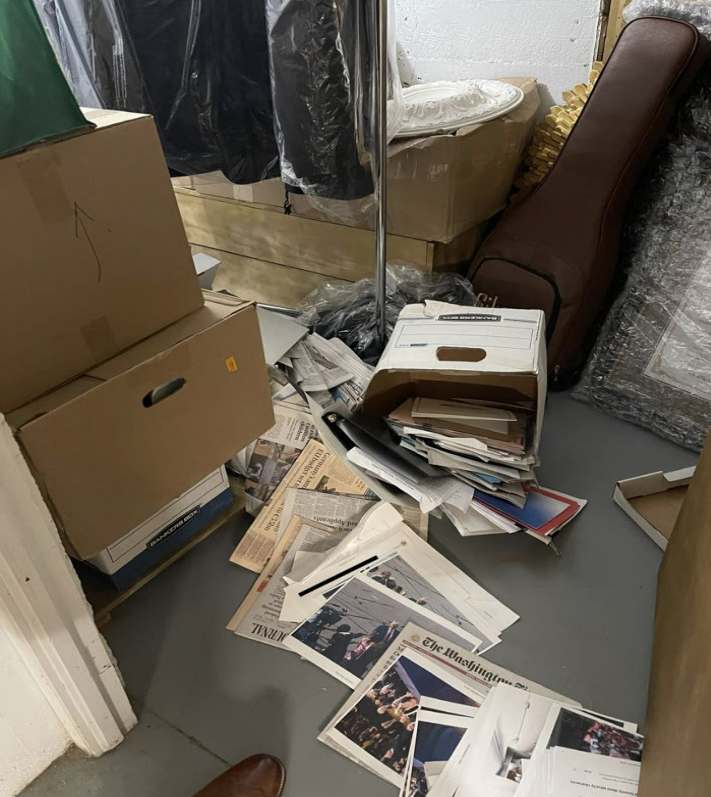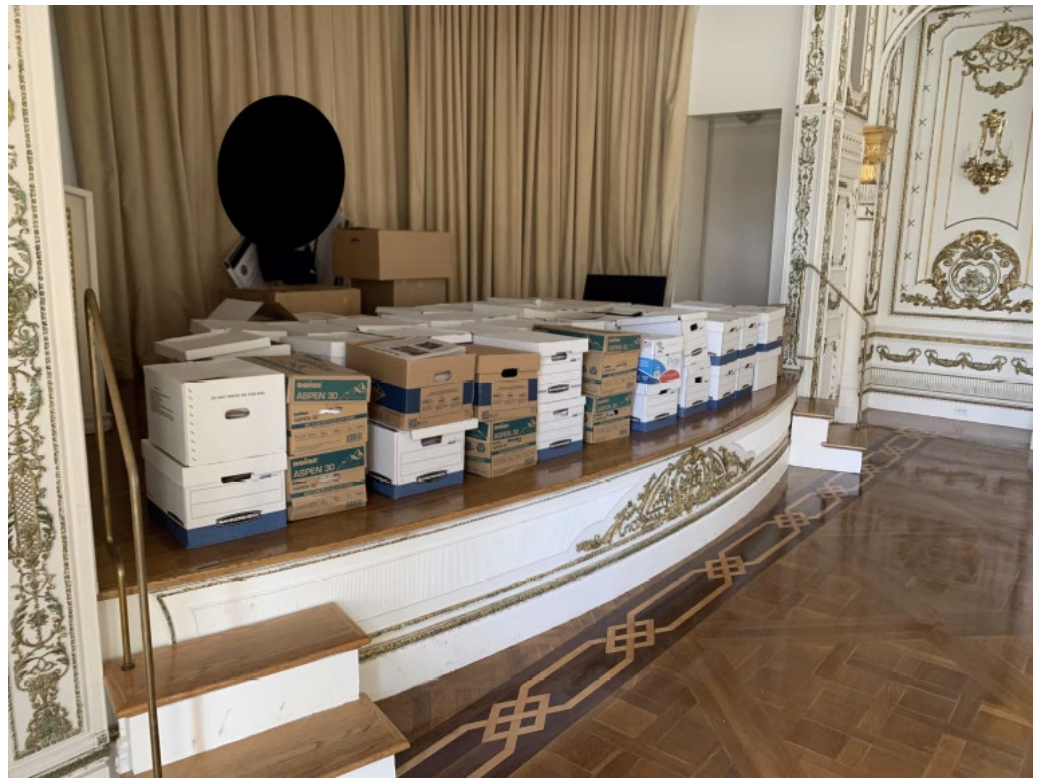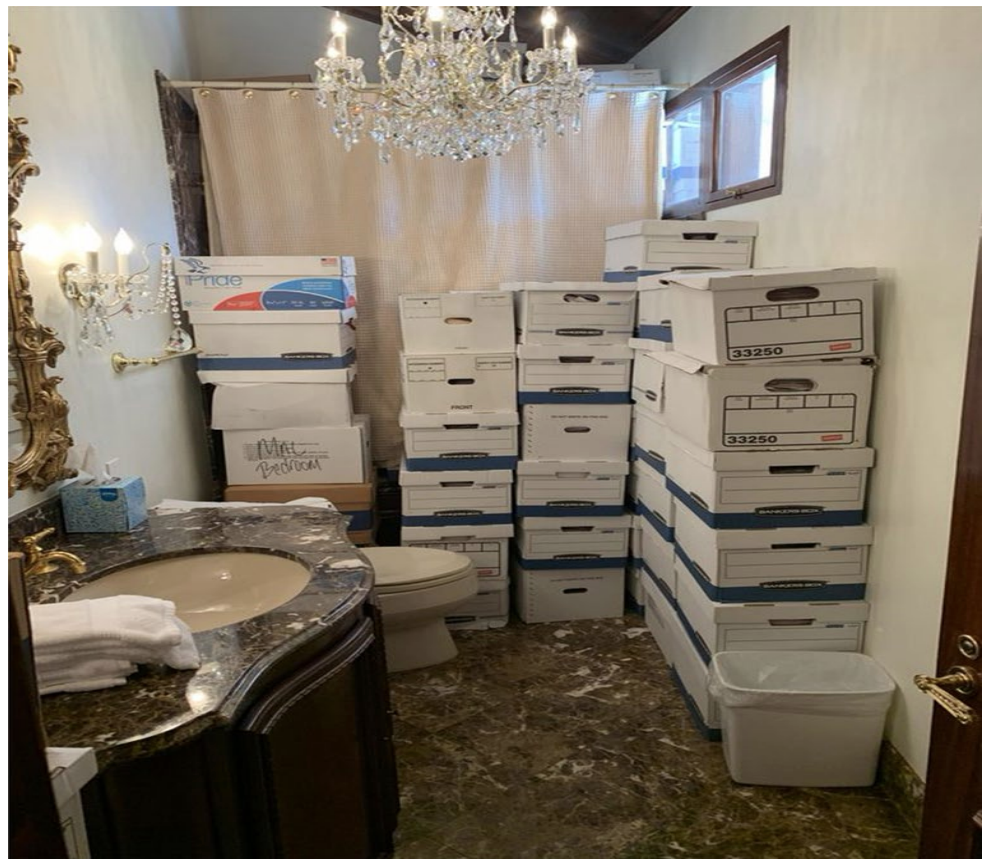In December 2021, according to U.S. prosecutors, an aide to former U.S. president Donald Trump found himself looking at something he had no clearance to see.

Spilled on the floor of a storage room at Trump’s Mar-a-Lago resort and estate — a room easily accessible from the pool patio, and near a liquor supply closet and other high-traffic areas — were allegedly the contents of several boxes of documents Trump had brought to Florida from Washington at the end of his presidency.
The boxes had been moved into the storage room from other parts of the club, including a ballroom and bathroom, at Trump’s direction the previous summer, according to a federal indictment that was unsealed Friday.
That indictment says one of the documents on the floor was marked “SECRET//REL TO USA, FVEY” — a classification marking that indicated the information could only be viewed by intelligence agencies within the Five Eyes alliance of Canada, the U.S., the United Kingdom, Australia and New Zealand.
The aide, Walt Nauta, took two pictures of the mess with his phone and texted another employee of Trump, with the Five Eyes-only document in full view, the indictment states.
“I opened the door and found this…” Nauta is quoted as having texted.
“Oh no oh no,” the employee texted back.
Trump’s alleged withholding of that document is one of the 37 federal criminal charges he’s now facing, accusing him of illegally retaining classified government documents after leaving the White House and then conspiring to obstruct a federal probe of the matter.
Nauta, who worked for Trump at the White House and Mar-a-Lago, faces six counts in the case for allegedly helping to hide some of the sought-after materials and making false statements to investigators.
The indictment presents a series of stunning examples of how Trump appears to have handled classified intelligence both in Florida and at his Bedminster estate in New Jersey, where prosecutors say he also took some of the materials despite being the subject of an FBI subpoena.
Taken together, the news has raised fears that Trump’s alleged behaviour could pose a threat not just to the United States, but to its allies as well.
“(This is a) gross mishandling not just of U.S. intelligence, but of allied, coordinated intelligence, which suggests that this is going to make allies much more reticent to share,” said Christian Leuprecht, a senior fellow at the Macdonald-Laurier Institute and Queen’s University professor who specializes in defence and security and has extensively documented the Five Eyes alliance.

According to the indictment, Trump openly discussed a “plan of attack” against another country that a military official had drawn up, telling a writer that the “highly confidential” information could not be declassified as he was no longer president.
“See, as president I could have declassified it,” Trump is quoted as saying during the exchange, which prosecutors say was recorded. “Now I can’t, you know, but this is still a secret.”

Get breaking National news
An unnamed Trump staffer is then quoted as saying, while laughing, “Now we have a problem.”
In another incident detailed in the indictment, Trump allegedly showed a member of his political action committee a classified map of a different country where a military operation was underway. Trump allegedly told the person he should not be showing the map and “to not get too close.”
Documents kept by Trump also allegedly included information on U.S. and foreign countries’ defence and weapons capabilities, U.S. nuclear programs, U.S. vulnerabilities to potential military attacks, and plans for possible retaliation in response to foreign attacks, according to the indictment.
Photographs included in the indictment show several file boxes allegedly containing classified materials on the open stage of a ballroom at Mar-a-Lago during the first two months of Trump’s post-presidency, and later in a bathroom and shower next to a toilet.
The indictment alleges Trump repeatedly expressed his desire to stall or undermine efforts to return the materials. At one point, according to notes from his attorneys, Trump told his legal team, “I don’t want anybody looking through my boxes,” and asked if it would be better “if we just told them we don’t have anything here.”
“His egocentric, idiosyncratic, egotistical behaviour suggests that he has no appreciation for the broader strategic ramification of his behaviour,” Leuprecht said.
Concerns beyond documents case
There have long been concerns about Trump’s handling of classified information, dating back to when he first entered the White House in 2017.
At that time, former intelligence officials warned Canada should consider severing intelligence sharing ties with the U.S. after British intelligence on the Manchester Arena suicide bombing was leaked by American government sources.
That incident came shortly after Trump divulged classified intelligence acquired from Israel during a closed-door meeting with the Russian foreign minister and Russia’s ambassador to the U.S.
While the U.K. briefly stopped sharing intelligence with the U.S. over the Manchester leaks, Canada did not make a similar move.
A spokesperson for Public Safety Minister Marco Mendicino’s office told Global News the government would not comment on the Trump indictment, but indicated Canada still has confidence in a Five Eyes alliance that includes the U.S.
“We will continue to work closely with our Five Eyes partners to protect our shared interests and values,” the statement said.

Leuprecht said the U.S. is considered to be the “top of the pyramid” of the Five Eyes alliance given the size and scope of its intelligence community, making it all the more crucial for the U.S. to demonstrate it can be a trusted partner.
While intelligence leaks from the U.S. are expected, he said the assumption is that the system protecting that intelligence is robust and adequately safeguarded.
“What we see here is that the system is not safe,” he said.
“The system is not safe from politicians who clearly have access to highly sensitive documents, and where there seems to be no really effective mechanism in place to ensure that documents are not mishandled.”
As seen during the so-called Discord leaks of classified materials this year, alleged to have been shared by 21-year-old U.S. airman Jack Teixeira, the vulnerabilities of the U.S. intelligence community extend beyond Trump.
But as the Trudeau government faces its own crisis over how it has dealt with intelligence alerting to attempts at foreign interference, Leuprecht says it’s even more crucial for the U.S. to be a reliable partner — something that could be further called into question if Trump wins re-election to the White House next year.
“This will only further bolster mistrust,” he said, “And this anti-Americanism, this distrust, undermines the confidence of the transatlantic security relationship among allies and partners and plays right into the hands of of our adversaries.”











Comments
Want to discuss? Please read our Commenting Policy first.